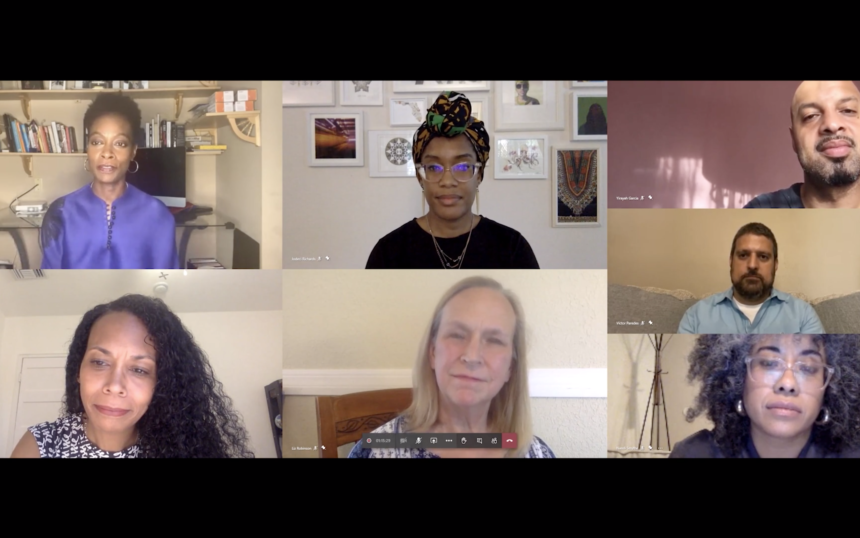Marketing industry leaders discussed racial justice, COVID-19 and how the industry will evolve because of these two crises at the Cannes virtual event Lions Live. Keep reading for highlights from some of Thursday’s talks.
Evolving the ad industry
Global advertising leaders came together for a debate about how the industry has changed from COVID-19 and the Black Lives Matter movement.
The panel kicked off with conversations about creativity, and how global crises can both suppress and inspire creative solutions. One leader, Jean Lin, global CEO for creative at Dentsu Aegis Network and global CEO of Isobar, said the type of creative work shifted drastically in Asia once the pandemic hit.
“In a crisis like COVID, you need an outpouring of creativity to make things work. If you look at the work we’re doing, this may not be work that necessarily wins in an award show, but it’s certainly work that wins in the world and in consumers lives,” she said.
She described how agencies quickly had to create contactless delivery processes or design applications that prioritize the needs of healthcare workers in delivery. “Those are the things that actually work, that’s the creativity empowered by data and technology, but more so by empathy,” she said.
The agency leaders also discussed how the nature of work has changed because of the pandmeic. Lorraine Twohill, chief marketing officer at Google, discussed the need for flexibility in the future because the pandemic has proven that all employees don’t need to come to the office every day.
She floated ideas like convening mostly remote teams at on-sites in the office, rather than off-sites, to work on projects together.
Mark Read, CEO of WPP, also discussed making a more flexible environment once people can come back to the office.
“We’re going to be working in a much more flexible way,” he said. “Once things get back to normal we’ll have forgotten what normal was like. The pandemic forced collaboration in a new way and in many ways encouraged a flourish of collaboration.”
Finally the leaders discussed how the movement for racial justice needs to change the industry. Steve Stoute, founder and CEO of Translation, said agencies need to change and their clients need to hold them accountable.
“You have companies that act surprised about what you’re seeing right now, the topic of race coming up, act like they’ve never seen it before. That’s the part of it that upsets me the most,” Stoute said. “Every brand, every agency need and African American strategy based on society’s new expectations. It has to be measurable and has to be public, that’s one of the things that has to be expected coming out of this.”
Injustice and marketing
Monique Nelson, chair and CEO of multicultural marketing agency UWG, discussed how her team is overcoming injustice and finding inspiration in the dedication and passion behind the Black Lives Matter movement.
Nelson said her diverse team and inclusive environment at UWG helps the agency serve underserved communities. She called on her staff to talk about how the pandemic and death of George Floyd has affected their work and the marketing industry.
“The role of creativity is so important when it comes to injustice. The work we as an industry do reflects what’s happening in the world, or not,” Nelson said. “That’s also the reason why it’s so important to have diverse voices in advertising and brand strategy and understand what’s happening, because we actually can make a difference. People see what we do and what a brand believes is important. With all the dollars [brands] can put behind it, it’s imperative that it shows the true reflection of what’s happening and can be part of the solution rather than adding to the problem.”
Her staff spoke about being creative during such a tumultuous time in the panel and using that creativity to fight racial injustices.
“It sparks the thinking of what we can do to combat things like inequality and injustices in our society,” said Yirayah Garcia, group creative director at UWG. “Creativity in the face of injustice is becoming a tool.”
“What creativity brings to the table is action, purpose and habit,” said Victor Paredes, VP of creative strategy at UWG. “Creativity is important because it is active. Anything we need to accomplish or work toward and improve in society and in business takes action. You cannot declare equality, you cannot declare that you are going to be better behaved, you have to act towards it, commit towards it, and it has to be a persistent habit.”
Other UWG staff discussed in the panel how agencies can be part of the solution by ensuring diverse voices have a seat at the table and being transparent about inclusion.
“There are women around the table, people from everywhere and we’re led by a Black female CEO, it’s such an important thing to see when it comes to advertising, when it comes to getting out messages that matter,” said Nandi Smythe, director of content strategy. “In this moment more than any other, I feel the importance of having that seat at the table. There is no way we can have these conversations and actually progress them and make a difference, if everyone sitting at the table looks the same way. This is not easy work at all.”
“A big world we should be looking to is transparency. That’s what people are wanting in this moment, that’s what they want from brands, that’s what they want from their neighbors and the people they work with,” said Jodeci Ricahrds, senior copywriter. “It’s not enough to say here are facts and figures. You have to make sure the environment you cultivate is one that celebrates people of color in your company, especially in this industry. Make sure that if you want their voices to actually be heard and be representative of your company they feel like they can speak and feel like they can be heard.”







